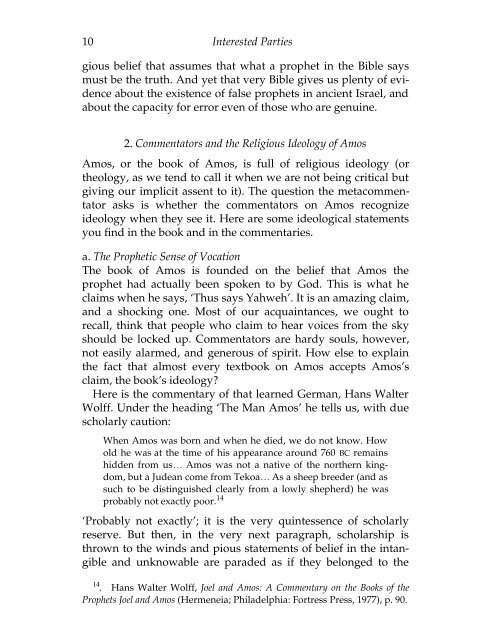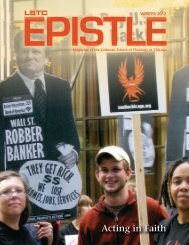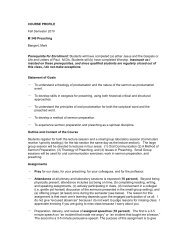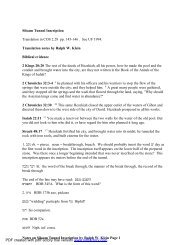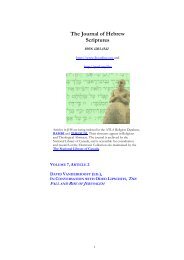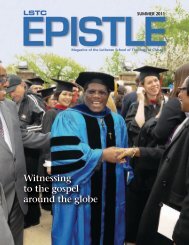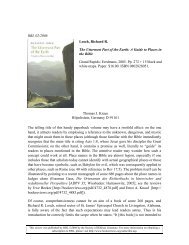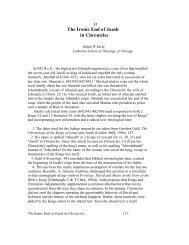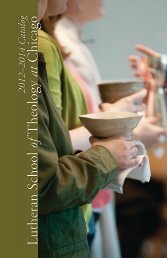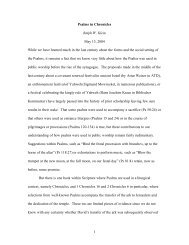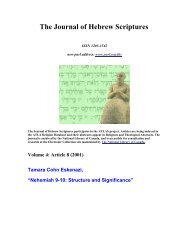Metacommentating Amos* Metacommentary, what is that ... - Fontes
Metacommentating Amos* Metacommentary, what is that ... - Fontes
Metacommentating Amos* Metacommentary, what is that ... - Fontes
Create successful ePaper yourself
Turn your PDF publications into a flip-book with our unique Google optimized e-Paper software.
10 Interested Partiesgious belief <strong>that</strong> assumes <strong>that</strong> <strong>what</strong> a prophet in the Bible saysmust be the truth. And yet <strong>that</strong> very Bible gives us plenty of evidenceabout the ex<strong>is</strong>tence of false prophets in ancient Israel, andabout the capacity for error even of those who are genuine.2. Commentators and the Religious Ideology of AmosAmos, or the book of Amos, <strong>is</strong> full of religious ideology (ortheology, as we tend to call it when we are not being critical butgiving our implicit assent to it). The question the metacommentatorasks <strong>is</strong> whether the commentators on Amos recognizeideology when they see it. Here are some ideological statementsyou find in the book and in the commentaries.a. The Prophetic Sense of VocationThe book of Amos <strong>is</strong> founded on the belief <strong>that</strong> Amos theprophet had actually been spoken to by God. Th<strong>is</strong> <strong>is</strong> <strong>what</strong> heclaims when he says, ‘Thus says Yahweh’. It <strong>is</strong> an amazing claim,and a shocking one. Most of our acquaintances, we ought torecall, think <strong>that</strong> people who claim to hear voices from the skyshould be locked up. Commentators are hardy souls, however,not easily alarmed, and generous of spirit. How else to explainthe fact <strong>that</strong> almost every textbook on Amos accepts Amos’sclaim, the book’s ideology?Here <strong>is</strong> the commentary of <strong>that</strong> learned German, Hans WalterWolff. Under the heading ‘The Man Amos’ he tells us, with duescholarly caution:When Amos was born and when he died, we do not know. Howold he was at the time of h<strong>is</strong> appearance around 760 BC remainshidden from us . . . Amos was not a native of the northern kingdom,but a Judean come from Tekoa . . . As a sheep breeder (and assuch to be d<strong>is</strong>tingu<strong>is</strong>hed clearly from a lowly shepherd) he wasprobably not exactly poor. 14‘Probably not exactly’; it <strong>is</strong> the very quintessence of scholarlyreserve. But then, in the very next paragraph, scholarship <strong>is</strong>thrown to the winds and pious statements of belief in the intangibleand unknowable are paraded as if they belonged to the14 . Hans Walter Wolff, Joel and Amos: A Commentary on the Books of theProphets Joel and Amos (Hermeneia; Philadelphia: Fortress Press, 1977), p. 90.


